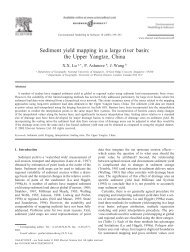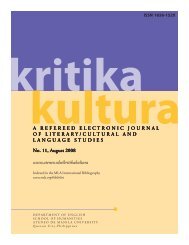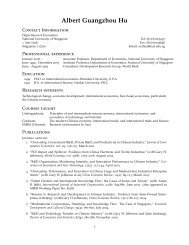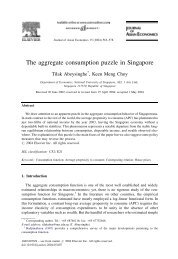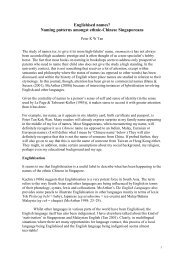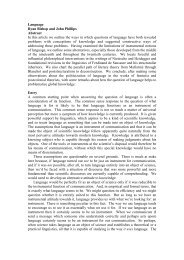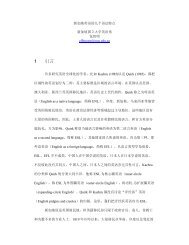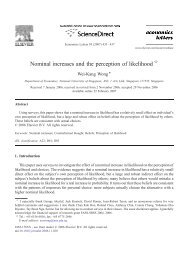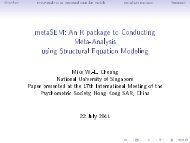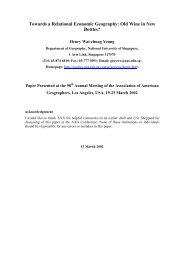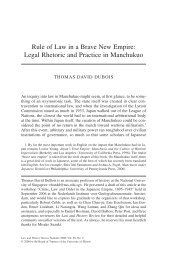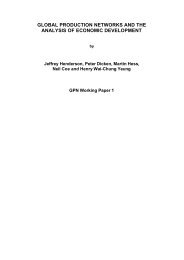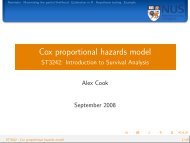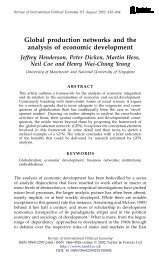Researching Hybridity in Social and Economic ... - NUS Home
Researching Hybridity in Social and Economic ... - NUS Home
Researching Hybridity in Social and Economic ... - NUS Home
You also want an ePaper? Increase the reach of your titles
YUMPU automatically turns print PDFs into web optimized ePapers that Google loves.
subsequently able to reach several other key actors of the quasi-family bus<strong>in</strong>ess network <strong>in</strong><br />
Hong Kong <strong>and</strong> <strong>in</strong> S<strong>in</strong>gapore. This snowball method worked well for me <strong>in</strong> trac<strong>in</strong>g some<br />
parts of the actor networks <strong>in</strong> Ch<strong>in</strong>ese capitalism.<br />
Trac<strong>in</strong>g actor networks clearly has a spatial dimension <strong>and</strong>, as I have argued earlier, <strong>in</strong><br />
situ research is an <strong>in</strong>dispensable method to enable economic geographers to go beyond us<strong>in</strong>g<br />
“remote sens<strong>in</strong>g” to study today’s complex social <strong>and</strong> economic life (see Figure 1). By<br />
“remote sens<strong>in</strong>g”, I mean those researchers who study Ch<strong>in</strong>ese capitalism from a distance<br />
through postal questionnaire surveys <strong>and</strong> do not really conduct <strong>in</strong> situ research such as<br />
personal <strong>in</strong>terviews, participant observations or focus-group discussions. This “remote<br />
sens<strong>in</strong>g” approach is commonly adopted <strong>in</strong> the bus<strong>in</strong>ess <strong>and</strong> management studies of Ch<strong>in</strong>ese<br />
capitalism <strong>and</strong> I have significant reservations on its validity <strong>and</strong> reflexivity (see Yeung, 2003).<br />
S<strong>in</strong>ce many actor networks <strong>in</strong> Ch<strong>in</strong>ese capitalism are mult<strong>in</strong>ational <strong>in</strong> their locational<br />
characteristics, it becomes imperative for me to engage <strong>in</strong> multi-locational fieldwork <strong>in</strong> order<br />
to track down these networks. Many such actor networks are <strong>in</strong>creas<strong>in</strong>gly transcend<strong>in</strong>g Asia<br />
<strong>in</strong> their geographical scope (e.g. Olds, 2001; Zhou <strong>and</strong> Tseng, 2001; Gomez <strong>and</strong> Hsiao, 2004).<br />
Conduct<strong>in</strong>g multi-locational <strong>in</strong> situ research creates serious time <strong>and</strong> resource constra<strong>in</strong>ts on<br />
my projects. But transnational research also offers many benefits, <strong>in</strong>clud<strong>in</strong>g deeper <strong>in</strong>sights<br />
<strong>in</strong>to the material <strong>and</strong> discursive constructions of these actor networks <strong>and</strong> better<br />
underst<strong>and</strong><strong>in</strong>g of spatially differentiated contexts of these constructions. The need for multi-<br />
locational <strong>in</strong> situ research also generates certa<strong>in</strong> scope for cross-border research collaboration.<br />
On the one h<strong>and</strong>, I can offer my expertise <strong>in</strong> theoriz<strong>in</strong>g actor networks <strong>in</strong> Ch<strong>in</strong>ese capitalism<br />
at different geographical scales. On the other h<strong>and</strong>, researchers from political science,<br />
sociology, <strong>and</strong> bus<strong>in</strong>ess management may offer relevant <strong>in</strong>sights <strong>in</strong>to the politics of Ch<strong>in</strong>ese<br />
capitalism, the social organization of actor networks, <strong>and</strong> the management of Ch<strong>in</strong>ese<br />
bus<strong>in</strong>ess firms <strong>in</strong> the host countries.<br />
23



